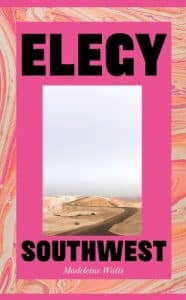
Back on the road the desert seemed obliterated by the bright green, perfectly square fields of alfalfa, lettuce, and sugar beet, all growing on irrigated water.
Eloise and Lewis have been together for five years or so. He seemed to be looking for commitment from the start, mentioning marriage before love. The death of his mother in the spring has hit him hard. Eloise is worried about his self-medicating, hoping that the trip might help. She’s in charge of their route which begins in Las Vegas, taking them through Nevada, into Arizona and Lewis’s hometown of Phoenix for Thanksgiving with his family, then on to Utah. As they travel through the dramatic landscape, Eloise contemplates the mighty Colorado reduced to a trickle by a drought which took hold several years ago, its water used to power thirsty cities where sprinklers play on lawns, farmers grow water-hungry vegetables and anyone with money has a swimming pool. Throughout their journey, awareness of the seemingly unstoppable wildfires is a constant, cinders falling like snow and spectacular sunsets made more so by smoke. As the two weeks wear on, it becomes clear that Lewis is in trouble leaving Eloise at a loss to know what to do.
The creosote and the live oak had made way for pinyon pines and juniper. Black maples planted along the highway were flushed in the red and orange of autumn leaves.
Rather like an eighteenth-century picaresque, each of the novel’s chapters is prefaced by a summary of its contents as Eloise looks back at this southwestern odyssey taken a few years ago. Watts’s evocative cinematic descriptions of the desert landscape offer a vivid backdrop threaded through a narrative in which climate change is a constant background hum together with the human intervention which may have seemed inventive when first enacted, but which has proved disastrous. At the forefront of this thoughtful, poignant novel, is a powerful grief which threatens to overwhelm both Lewis and his relationship with Eloise, their uncertain future resolved by Watts in her final chapter. There’s a bibliography of sources drawn on for the historical detail woven through Watts’s narrative which, in clumsier hands, might have turned into a litany of damage done but instead she’s written an engrossing and engaging love story for both Eloise and Lewis and for the planet, each reflecting the other.
Pushkin Press London 9781805337621 288 pages Hardback
Discover more from A Life in Books
Subscribe to get the latest posts sent to your email.

Even though I barely know America at all (though if Trump gets his way, I’ll be able to say I DO know parts of America, because I’ve had an extended visit to Canada …) you’ve comprehensively sold this book to me. In fact this dedicated library user might even BUY it!
Delighted to hear that! I loved those American road trips butI don’t think I’ll be returning. Apart from anything else, they’re on my climate change conscience.
I do love road trip books (fiction and non-fiction) and films. Especially ones set in America. One I particularly remember is Jenni Diski’s book about traveling around America on its train system, published 2002. So this book by Watts sounds up my street, especially as the storyline sounds authentic. It’s getting good reviews elsewhere too. I might invest and travel vicariously through the southwest, from my couch.
Me, too. America offers a great setting for both film and fiction. Have you read Amor Towles’s The Lincoln Highway? It’s a take on Homer’s Odyssey. I remember the Diski book – lots of camaraderie around smoking.
I will look out for Towles’s book. Another good American road trip book is Andrew Sean Greer’s Less is Lost. Sequel to his book Less.
Ah, I didn’t realise that. Thanks!
I don’t know if this would have caught my eye but you’ve definitely convinced me! Pushkin are always reliable aren’t they?
They are, and have quite a range. Hope you enjoy your trip to the desert!
This sounds wonderful, and I love the road trip aspect. One question, though – how much is it about grief and how well is that grief handled by the author? I’m open to novels on this but don’t want to wallow, if you see what I mean.
I think it might be a hard one for you now as Lewis’s grief is for his mother. Perhaps leave it for a while.
This sounds great. I actually hate road trip novels but I love the desert landscapes of Colorado etc so it’s both attracting me and turning me off at the same time! The descriptions sound so evocative.
They are! I love that red desert landscape which Watts depicts so well. Worth getting over the road trip novel loathing.
I like the sounds of this, even though, like Laura, I am cautious about the whole road-novel sitch.
It worked well for me, particularly the backdrop and the way that Watts wove the climate emergency through her narrative, but I do love a good road novel.
I like how you describe this as cinematic, that appeals to me.
Her descriptions of the desert landscape they drive through are fabulous.
Madelaine Watts is an Australian writer who had been living in NY for about a decade (I had to double-check this and found out that she has now moved to Berlin). I only say this because I am curious about how writers can (or cannot) capture the space and light and feel of another place that was not their childhood home. From what you’ve said it sounds like Watts was successful.
I’d noticed that she was an Australian writer, although I’m not sure which part she grew up in. She certainly does a brilliant job in evoking the landscape of the American southwest.
You do make me want to pick this one up, especially for the climate change and landscape aspects. Must look it up!
I thought she handled the climate change theme particularly well.